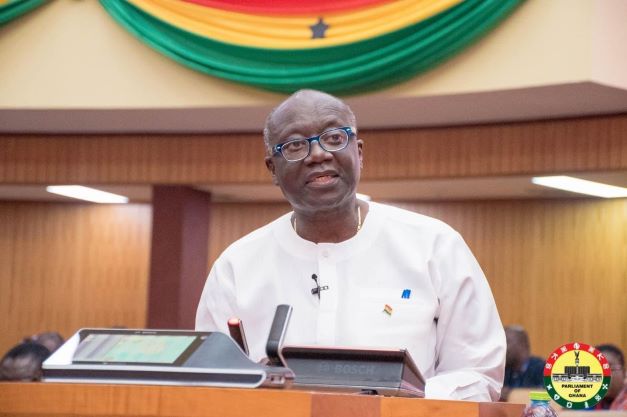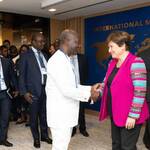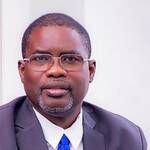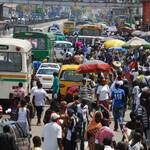In times of economic difficulty, people look for someone to blame. Usually they blame “others”, ie. foreigners. The Germans blamed the Jews for their pre-WW2 economic woes.
Ghanaian traders blame Nigerians traders for taking over their industry.
When faced with an economic downturn which began in the mid-sixties, Ghana kicked out “aliens”, mostly Nigerians in 1970, and Nigeria returned the favour in 1981.
South Africans blame “ama-kwerekwere” (the foreigners) for the drug problem in their country. Britons accused the EU of leaving them powerless by encroaching on the “Great” in Great Britain, leaving them only with Little Britain.
They blamed migrants for taking their jobs (and now they’re recruiting migrants to come back).
A struggling business would blame a competitor; a shop owner with dwindling sales would blame a mother-in-law (that witch!), and pastors experiencing low offertories flog the devil.
Human beings like simple answers to complex problems. We offload the burden of having to solve our problems if we can identify a common enemy, a target, to shoot arrows at.
It makes us feel better even if the relief is temporary. That the problem might recur in the future is not important. There’ll always be someone or something else to blame another day.
Psychologists say this is a natural coping-mechanism that begins from when we’re toddlers.
In Ghana the monster, the bogeyman, the target for our arrows is Ken Ofori-Atta, the finance minister.
Late last year, 90 or so parliamentarians from
his own party rebelled and demanded that President Akufo-Addo dismiss Ofori-Atta for the country’s economic troubles.
The clamour appears to have died down lately after engagements with the president who apparently asked the MPs to stand down until after an IMF deal is reached.
But, the NPP MPs weren’t alone.
The minority in parliament also sought to censure Ofori-Atta, and dragged him before a committee to prove his innocence, including on charges of conflict of interest on the grounds that Databank Financial Services of which he’s a shareholder and co-founder had profited from policies he had initiated.
But he cleared himself calmly and with admiration. In fact the charges of conflict of interest had previously been addressed by CHRAJ who had cleared him following a complaint by one Yaw Brogya-Gyamfi in 2017.
Civil society organizations and middle class commentators also joined the chorus for Ofori-Atta to be fired.
But, what’s the justification for blaming Ken Ofori-Atta for Ghana’s economic problems.
Was he not the finance minister when inflation dropped to single digit and foreign exchange reserves ballooned to a record high of $10.1 bn in 2021, among a raft of economic successes before the impact of COVID-19 began to bite?
At the time, did Ghanaians single out Ofori-Atta for praise? To the contrary, the critics said we don’t eat inflation and the positive macro-economic statistics were just numbers that didn’t reflect in our pockets.
Does Ofori-Atta head a parallel government? When a minister initiates a policy doesn’t it go to cabinet for debate before it’s approved?
When Ofori-Atta presents the national budgets with expenditures on salaries, roads, hospitals and schools, etc. are they not reviewed and approved by our parliamentarians?
If we have borrowed beyond our means, was it all entirely up to the finance minister? (Was everything borrowed by Ofori-Atta? Aren’t we servicing debts Ofori-Atta inherited?)
When the former Agriculture minister, Dr. Afriyie Akoto, was touting the Planting for Food and Jobs policy, was he financing it out of proceeds from his famous father’s farm? Was it not the finance minister who had to find the money to pay for subsidized fertilizer, warehouses and other inputs?
When the NPP touts the interchanges and bridges and roads the Akufo-Addo government has built, and when citizens enjoy the use of these infrastructure, how did we think they were being financed, considering how little we contribute in taxes as citizens?
A finance minister’s job is to find the money to pay for what the government as a collective and headed by an “Executive President” has decided to execute as a matter of national priority after approval by parliament.
We know, for instance, that Free SHS is a priority for President Akufo-Addo. He has been campaigning for it for years. It is one of the reasons he won in 2016.
The finance minister’s job is to allocate funds and have it approved by parliament for execution.
What else do we expect from the finance minister? Do we expect him to say he won’t pay? Is it his money?
A common and popular refrain from critics is what has Ofori-Atta done with our money? There are people who live in neighbourhoods where they drive on one-foot thick asphalt roads.
Yet they turn around and ask what has Ken Ofori-Atta done with “our money,”. Meanwhile they don’t even have TIN (Tax ID Number)!
People ask what all the covid funds were used for? We have forgotten the free water and electricity we consumed throughout 2020.
We have forgotten the resources spent on sanitizers, Veronica buckets and masks to enable millions of students to return to school during COVID-19 when other countries were sending children home.
We have forgotten the additional 34,000 health workers that were recruited into the health service to support vaccination and other health delivery services during the pandemic, and who have since been hired permanently.
We have forgotten that jobs for citizens cost money.
We have forgotten the millions that was channelled through the National Enterprises Agency to cushion enterprises hit by the economic impact of COVID-19.
We have even forgotten the dumsor we suffered only a few years ago. Despite the decline in government revenues and the spike in expenditure occasioned by COVID-19, electricity supply has been largely stable and we continued to have fuel at the pumps.
We have forgotten the 4 million customer accounts that were saved during the banking crisis and the associated cost? Some banks were collapsed or consolidated but customer accounts remained untouched. Would we rather have “saved the banks” and customers lose their money? What is a bank without customer accounts? What would the “banks” and “bankers” be managing?
I would question Ofori-Atta for not managing stakeholder relations much better, especially between 2017-19 when the going was good.
He should have built bridges at the peak because a trough was bound to follow.
In the end he did build those bridges to manage the debt exchange but it’s always best to build bridges before the floods.
Despite that, the venom directed at the Finance minister has not been justified overall.
One delinquent sixty-something year old alleged rapist of a teenage girl even had the courage to criticize Ofori-Atta’s morals and insult his innocent children as “nkwaseafuo” on national television whilst the presenters looked on sheepishly.
What surprises me is where Ofori-Atta finds the strength to “keep calm and carry on”.
It’s a mark of remarkable resilience that he has chosen to remain at his job and performed it even at the peril of his health, taking us hopefully to the verge of an IMF deal.
Many of us would have given up especially if we had built a successful private business prior to going into public service and don’t need to go over to our neighbour to, excuse me to say, beg for salt.
Maybe there’s something inside that Bible of his.
It may be true that a few years ago Ofori-Atta didn’t think going to the IMF for support was a good idea. Well, in the face of national economic adversity, he has changed his mind.
Or maybe it’s the president who has changed his mind. But that’s wrong with that?
You can as a matter of principle swear to be self-reliant, but in the face of crisis it would be foolish not to ask for help when help is available.
I hope and pray that we shall be successful with an IMF deal which can also trigger other bilateral and multilateral resources for Ghana to get back on track.
And next time inflation drops to single digit, hopefully we will not say again that we don’t eat inflation.#
By Mrs. Helena Mawuse Asamoah
- Friday, May 9, 2025 Newspaper Headlines - 9 May 2025
- Adangabey brightens rural kids’ future from his wheelchair - 9 May 2025
- Stanbic donates ICT equipment to UHAS for digital learning - 9 May 2025




